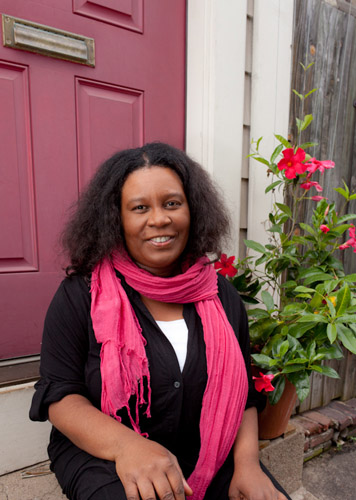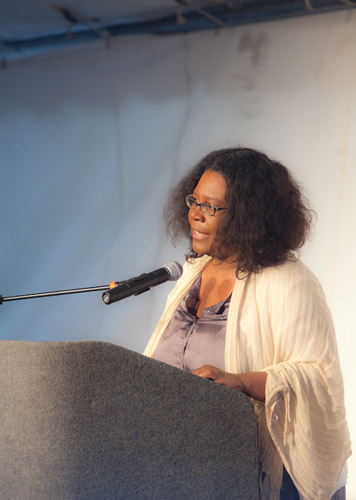Poet Claudia Rankine on Wounds We Should Not Forget
by Elizabeth Hoover / November 12, 2010 / No comments

Claudia Rankine on Sampsonia Way, Photo © Renee Rosensteel
According to Jamaican-born poet Claudia Rankine, “the realm of poetry is everything.” In her ambitious fourth collection Don’t Let Me Be Lonely, readers will find private reflection on a loved one’s death, discussion of police brutality, and stills from Sam Peckinpah’s films and news clips.
The way Rankine recombines these fragments is idiosyncratic and personal, but together they become social commentary. The book is a meditation on collective loss as the narrator travels throughout New York City trying to make meaning in the wake of the Sept. 11, 2001, terrorist attacks.
A reviewer in Pleiades magazine writes, “I don’t know of a book of poems that so unabashedly, startlingly, successfully partakes of this contemporary combination of turbulence and torpor. It’s consuming to read, engulfing. Raw.”
And yet “book of poems” seems an inadequate moniker for this book that fuses poetry, photos, essay, and memoir. Rankine, who earned her MFA in poetry from Columbia University, has been challenging generic conventions since her first book Nothing in Nature is Private was published as the winner of the Cleveland State Poetry Prize.
She also experiments with theater; her most recent work, Provenance of Beauty, is performed on a bus and consists a poetic travelogue through South Bronx, where Rankine was raised.
In June, Cave Canem, an organization for African-American poets, held its annual retreat at the University of Pittsburgh’s Greensburg campus and joined City of Asylum/Pittsburgh for a free reading on Pittsburgh’s North Side. This is the third interview in a series of interviews with the poets who participated in that event.
Read the interviews with Carl Phillips and Sapphire.
You’ve mentioned T.S. Eliot and John Ashbery—two poets known for their densely allusive verse—as poets you admire. How have they influenced your work?
The modernist placed a lot of trust in allusions. For Eliot, that trust was necessary to write the poem. Ashbery is wonderful because he creates a space in poems where everything can exist. I love the idea of being in conversation with other poets, philosophers, artists, and the visual world. I love that if I include a photo in the poem, the signifying possibilities of that photo will take the reader so far beyond anything that I can think of. I love opening out the text in ways that I can’t control. That to me is exciting.
There are poets who feel that the realm of poetry is x-thing or y-thing, but I believe that the realm of poetry is everything. If you can think about it and negotiate it and talk about it, then it belongs in the poem. I don’t feel any pressure to resolve any conflicts that arise when you put disparate things together. I want that conflict.
The lyric is most often associated with short poems with a single speaker expressing personal thoughts and feelings. Don’t Let Me Be Lonely is a book-length text with a multiplicity of voices. Why did you choose to subtitle the book “An American Lyric”?
Much of the thinking in Don’t Let Me Be Lonely was inspired by lyric poetry, by people like Paul Celan and Emily Dickinson. It wasn’t an enterprise of information. It was an enterprise of emotional investigation into private thoughts. To me that’s the lyric.
I think of the lyric as creating a meditative space. There’s such a desire to separate our political and social condition from our domestic and private space. To me, they’re intertwined; what’s happening in the government determines where you live, how you live, who your neighbors are, how much money you have in the bank. I wanted to bring the entire political and social condition into a lyric meditative space. All of the best poetry—W.B. Yeats, Emily Dickinson, Walt Whitman—take on both our social and political condition and view it through their uniquely personal lens.
In 2003, Kurt Vonnegut told The Progressive that a protest by artists is as effective as “a banana cream pie three feet in diameter dropped from a stepladder four feet high.” Why bring politics into poetry? What can poetry actually do?
The irrelevance of poetry is also the power of poetry. You can go as far as you can go without having to negotiate people in your way. The only thing in your way is your own imaginative possibilities.
One of the ways you bring politics into Don’t Let Me Be Lonely is through repeating motifs. You keep returning to an image from a news clip about Amadou Diallo and Abner Louima, two victims of police brutality in the late ‘90s. In our normal daily life, that image wouldn’t be lingered on. The news would switch to another topic or we would change the channel. You refuse to change the channel.
One of the products of modernity is that we have so much access to what’s happening. We have a stream of information coming in. It is unprecedented when you think about how—between Facebook, Twitter, and the Internet—you can know everything right away. But you can also forget it right away because it’s being replaced the next second by different information.
There are certain ways in which we are being wounded that we shouldn’t forget. What happened to Louima – all the violence that happens to black men in this culture – is not something that should be forgotten. There have been moments when I’ve felt that if we could still them and keep them present, you could remind people, myself included, of these terrible things that are happening.

Rankine reads her work at an event sponsored by City of Asylum/Pittsburgh and Cave Canem
Photo © Renee Rosensteel
But doesn’t including references like that date your work?
When people say, if you write about certain things it dates your poetry, I just ignore them. It’s presumptuous to think that what you’re writing will exist for all time, then consequently disallow yourself from engaging in things that might date your work.
I think this really comes down to something as mundane as poets thinking that they don’t know enough or that their own reactions to public events aren’t valid even though they are also subjected to the ramifications of those events.
Politics is part of life and poetry is about life. The desire to designate poems that engage politics as some kind of “lesser than” poem seems to be naïve. Some of our most stunning poets took on politics—poets like Allen Ginsberg, Walt Whitman, W.B. Yeats, Czeslaw Milosz, Emily Dickinson.
Yeats, Whitman, Ginsberg, and Milosz all take on politics very explicitly in their work. Why do you include the famous recluse Dickinson in that list? She barely published in her lifetime.
Even though she doesn’t refer to things directly, she wrote during the Civil War, which was the most harrowing war this country has experienced. When you consider that, the depth of despair in some of her poems begins to make sense.
In the letters between Dickinson and her editor, Thomas Wentworth Higginson, she writes about poetry and publication. In those letters there is anger, but there is also choice. I love that she chose to keep her poems the way that she wanted them, even if that meant not publishing them. She actually showed a lot of agency. You might say that she allowed herself to be shut down and she was shut down, but I think it’s also incredibly progressive to continue to do what you want to do on your own terms, without public recognition.
Your work often structrually inventive is hard to categorize. Like Dickinson, did you face pressures to change your work for publication?
When I wrote Don’t Let Me Be Lonely a lot of people said to me, “This is really bad, you can’t publish this.” My original publisher said, “We’re not publishing this, this is not poetry.” You have to decide: I’m going to do it because I’m going to do it, even if it means nobody publishes it.
As a person of color, do you face additional pressures in terms of how you’re expected to write and what you’re expected to write about?
Not for me, which is the only person that matters. I’m very glad that I started out defining myself as a poet, but at this stage I see myself as a writer and an artist and so I just do whatever I want. If people want to say, “No, I can’t read this because it doesn’t satisfy my own understanding of poetry,” that’s fine with me. I love my education in poetry. I love poets. I love reading them. They are the people who have guided me through my life, who are necessary to me. Now I make films, I write plays, I do whatever I want. And it’s been working out for me.
Read Elizabeth’s bio.




